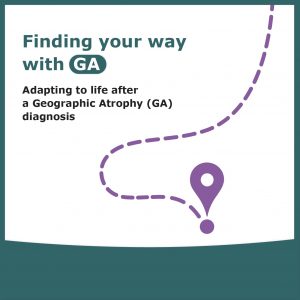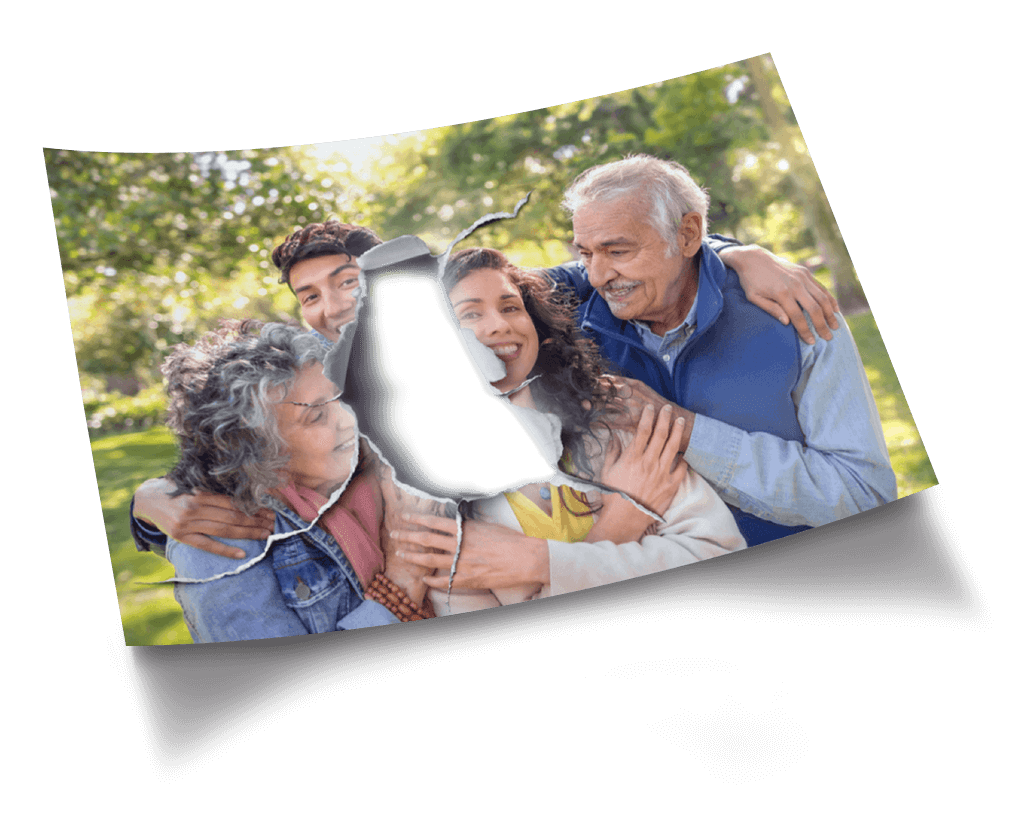GA stories
Hear from others either helping to diagnose or living with GA.
Learn about GA from Liz’s story
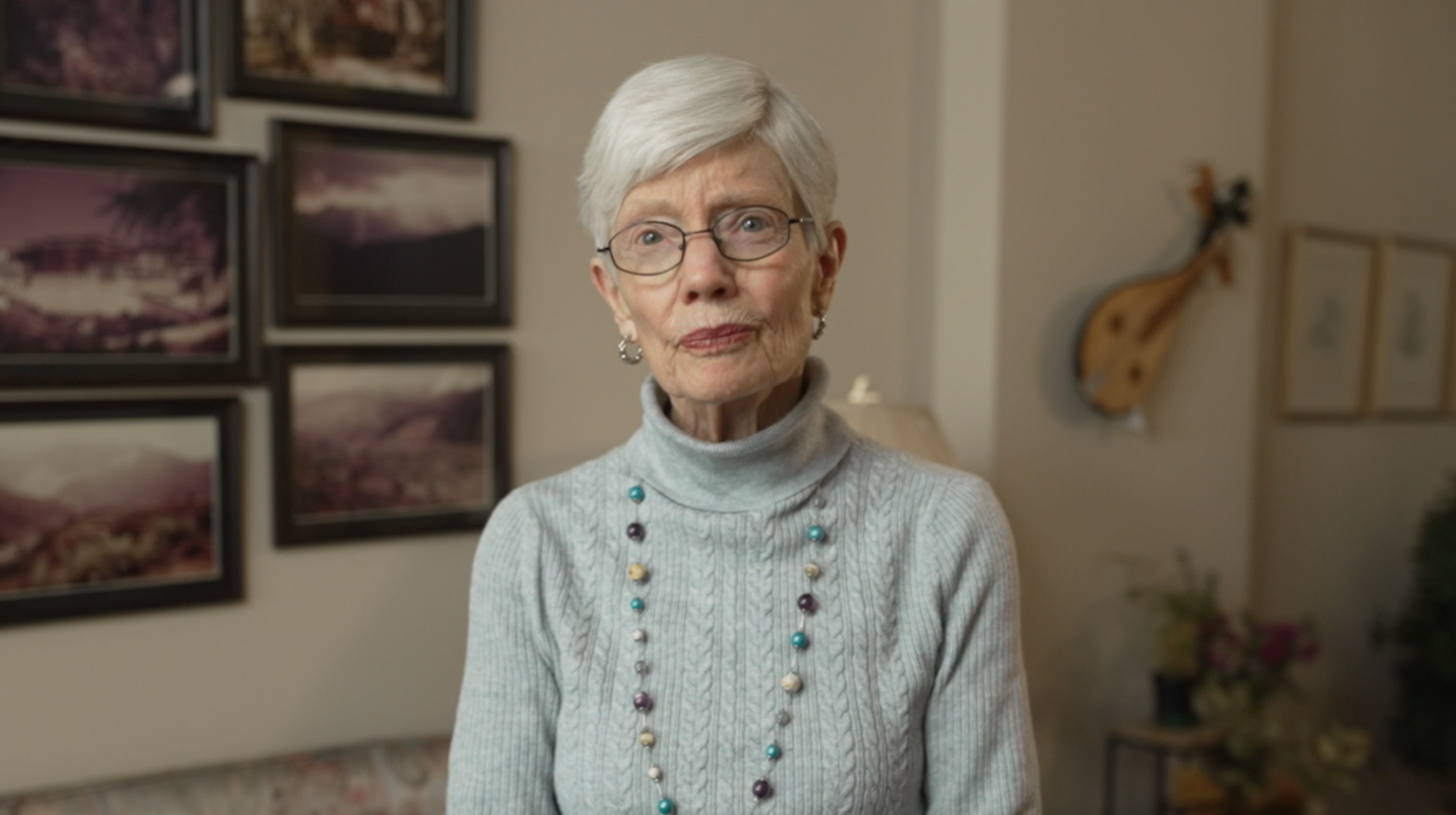
The following video was developed by Apellis, and the patient was compensated to share her story. It contains the views, opinions, and experiences of Liz, a person living with Geographic Atrophy (GA). The video does not include individual treatment or medical advice. You should consult your doctor with any questions or concerns you have about living with GA.
VO: When I think about it, I would have to say that virtually every aspect of my life has changed. It’s not just that you’ve lost a physical ability. You also really have to try to hang on to your sense of who you are. My name is Liz Tully, and I’m in my early 80s.
It’s really hard for me to say when I first started noticing symptoms of GA. But they were things like when I was reading, all of a sudden, an odd letter, or word, or sometimes even a whole sentence would suddenly jump up and appear in the line before the line I was actually reading. Or when I was driving, especially at night if it had been raining, and the streets were wet. I couldn’t see very well, and I felt very uncomfortable. And then, after a few years I suddenly started to notice that when I went from a lighter area into a darker one, I couldn’t see where I was. Until I let my eyes adjust.
So, the really important thing I want to say to anybody who is experiencing symptoms like this, and like I, at the time, thought they were just eye fatigue… don’t assume anything. Only an eye doctor can tell you whether or not you are developing GA. My left eye now registers 20/200 on the eye test my doctor gives me. Which is legally blind in Canada. But my other eye is still, I’m very lucky, it’s gone from 20/40 to 20/60. Which is considered low vision.
One of the things I’ve noticed as my GA has progressed, is that how I do things has to constantly change. One of the things you know you have to be aware of when you develop something like vision loss, is you really feel like you’re losing your sense of identity, who you are. And it’s so important to hang onto as much of that as possible. And for me, that means wearing a bit of jewelry. I’m rubbish with scarves, but a bit of jewelry is really nice. But I have to be able to find it. So, I’ve dreamt up getting a series of bowls of different sizes. And each bowl has its own specific contents. So, I can feel what’s in there.
Everybody reacts differently to the news that they have GA. Because it is devastating news to be told that you’re losing your sight. You really have to come to grips with it. Because if you don’t, you can’t move on. And to do that, I needed to grieve. I really needed to acknowledge what was happening, and what I was losing. But then I needed to remember what I still had. I know I’m going to continue to have good days and bad days. That just goes with the territory. But I know that if I really enjoy the good days, and I try to do that, I’m going to be able to weather the bad days.
Learn about GA from Retina Specialist, Dr Holekamp
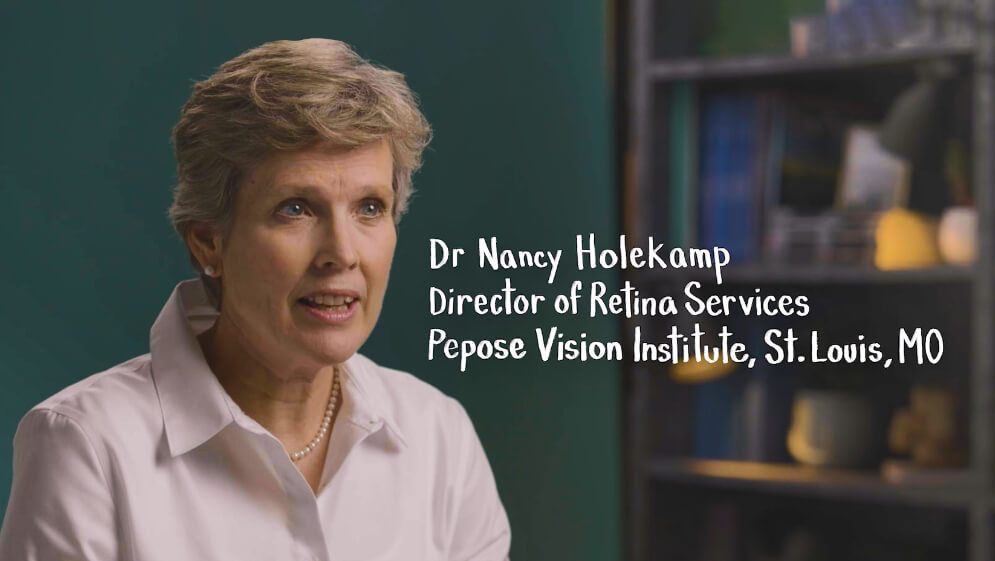
The following video was developed by Apellis, and Dr Holekamp was compensated for her time. This video is not intended to include medical advice. You should consult your doctor with any questions or concerns you have about Geographic Atrophy (GA).
VO: My name is Nancy Holekamp, I am a retina specialist in St. Louis, Missouri, and today I’d like to talk to you about Geographic Atrophy, or GA.
When I speak to my patients about GA, I tell them it is a very advanced form of age-related macular degeneration and the most important risk factors are age and genetics, so family history matters, but other risk factors include diet and obesity.
To be clear, age and family history are the leading risk factors for GA, so you have to have both age and the genetics in order to get GA.
To explain GA, I often show patients their scan like the one you’re seeing now. And here we see little accumulations of waste products called drusen that accumulate in the macula. The macula is just a fancy word for the centre of the retina which is the centre of your vision. In an eye with GA, the drusen are always growing closer to the centre point of vision, which means the GA is always growing closer to the centre point of vision.
So as the drusen grow and enlarge, then collapse into atrophy, they will form regions that you can actually draw a line around, almost like a geographic area or a map, and that’s why we call it Geographic Atrophy.
Atrophy means cell death, so the cells in your retina are slowly dying. Early on you may not notice any change in your vision, but as it progresses it will eventually affect your central vision. Please keep in mind that while you may never lose peripheral vision, GA does cause irreversible vision impairment.
What you’re seeing on the screen right now is an example of a scotoma or a blind spot that will affect your vision over time. But this is just an example; each person experiences GA differently.
While your central vision may be impacted, you should always maintain the ability to move around and take care of basic needs.
However, you may need to make significant life changes and ultimately depend on others for things such as driving. Getting a proper diagnosis of GA is very important. A diagnosis leads to prognosis, which helps you understand how this disease will affect you over time.
Science is learning more and more all the time about GA, and we are becoming more knowledgeable about this disease.
If you have vision symptoms, be sure to call your eye doctor who may refer you to a retina specialist. Seeing a doctor is critical.
Learn about GA from Santi’s story

The following video was developed by Apellis Pharmaceuticals, and the patient was compensated by Apellis to share her story. It contains the views, opinions, and experience of Santi, a person living with Geographic Atrophy (GA). The video does not include individual treatment or medical advice. You should consult your doctor for medical advice or about any questions and concerns you have about living with GA.
Geographic Atrophy (GA) is the advanced form of Dry Age-Related Macular Degeneration (Dry AMD). GA is a leading cause of blindness that affects 5 million people worldwide.
Boyer DS, et al. Retina 2017.
VO: For me, even as a little girl, I was so visual – and I would just thank God just for everything I could see. I’m so amazed at things that are beautiful, and did I know that somewhere down the road I was going to get this diagnosis? I don’t know.
I have Geographic Atrophy in both eyes. Getting this diagnosis terrified me. I was afraid to go to sleep. I didn’t want to wake up and have lost the world. And I think we all get challenges in life, this was mine.
And when the Geographic Atrophy hit, it went down fast. And then things started to disappear, like a phone pole would be crooked and there’d be parts of that pole that I wouldn’t see. And then I was legally blind. I’ve always been very independent and very visual. To think of missing that bird that’s at the feeder or the bunny that crosses the street. If I couldn’t walk my dog.
Going down stairs is very scary because of the depth perception. I fell down my stairs here very badly. I immediately tried to minimize it, but I couldn’t get up. I was really hurting. I thought, “there’s going to be a day when I’m not going to be able to drive.” I sold my house. I moved where I could walk everywhere. You know, all these things to try to troubleshoot but the hard part was the emotional part.
I have to feel useful. I started to go to this orphanage and just working with the kids, talking to them, I started to feel such a sense of peace. I was always a helper. I was always the one taking care of people. I have to find that middle road of being able to ask for help with grace and appreciation.
I hope that it doesn’t come to the point where I don’t see it. You know, I don’t want to miss one sunrise. In every challenge I’ve ever had, there’s always been a gift that hasn’t been apparent right away. But if there always has been, I’m assuming there always will be.
Learn about GA from Susie’s story
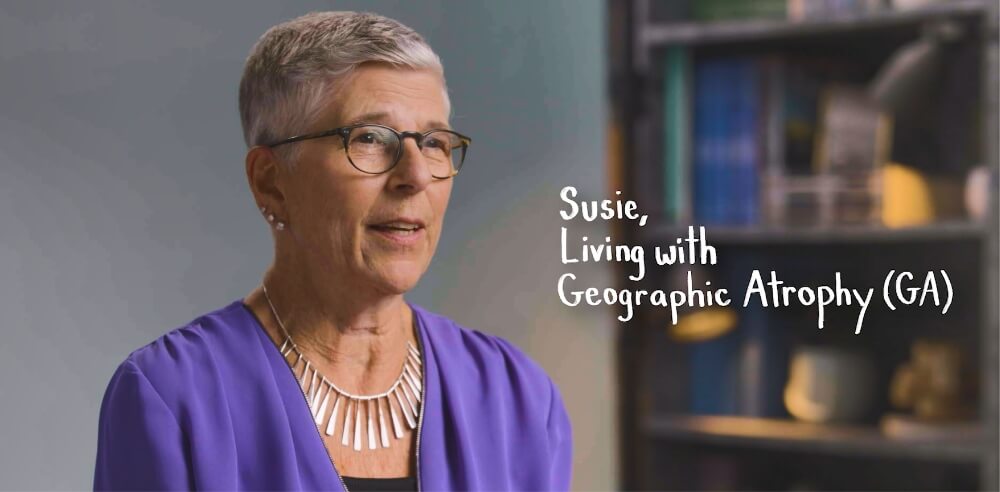
The following video was developed by Apellis, and the patient was compensated to share her story. It contains the views, opinions, and experiences of Susie, a person living with Geographic Atrophy (GA). The video does not include treatment or medical advice. You should consult your doctor with any questions or concerns you have about living with GA.
VO: Hi, I’m Susie, I’m from St. Louis, Missouri. I’m a retired university professor, physical therapist, now an education consultant. I’m a mother, a wife, a grandmother, and I have Geographic Atrophy.
I was diagnosed with age-related macular degeneration in 2005 and advanced to a diagnosis of Geographic Atrophy, or GA, in 2014.
I wasn’t familiar with the terms GA but my mother had the condition and she was quite impaired in her later years; she lived to 98.
I have learned so much about GA since I was diagnosed and there are two critical things to know.
One is early diagnosis is really important and the second is the disease is progressive and it will get worse over time.
The very first thing to do after a diagnosis of GA is to ask your doctor to show you the scans of your eyes. If you’re not seeing the scans every time you go to the doctor I suggest that you ask to see them, both sides and the comparisons from previous visits.
My doctor reassures me regularly that although GA is a progressive disease, I won’t lose my vision quickly. I may lose considerable central vision over time.
One of the things that I do to test my own vision is cover my right eye, which is my strong eye, and then I look at certain things that are familiar to me. So when I do that here, the camera is now blank, but I can see there is a camera.
It’s really important to mention proactively any changes you see to your doctor. I’m really fortunate to have my doctor who explains the condition and the science behind it very simply to me and very regularly. You and your doctor aren’t the only ones who should talk about the diagnosis of GA. It’s an invisible disease to everyone around you, so talking with your family and friends about your needs is very important after the initial diagnosis.
And this is an adjustment that I think people should make – plan ahead for loss of vision. It’s very important to plan ahead and not lose hope.
For example, I’ve been memorizing the feeling of the fabric of my clothing for when it may be more difficult to identify their colours.
So stay positive, stay engaged. Always keep in touch with your retina specialist if you have concerns about your vision or GA.
If you’re living with GA, or have AMD and notice any vision changes, it’s important to talk to your eye doctor.
How to talk about GA
For patients
Talking to your eye doctor and family about GA is important. Here are some tips to start the conversation.
When talking to your eye doctor
Be aware
Keep track of vision changes. For example, make note if you start to have trouble driving at night or need more light when reading.
For an easy way to help track vision at home, get the Amsler Grid.
Tell the whole story
Talk about how vision changes are impacting your life, and ask about available resources to help.
Be open and communicate
If you have been diagnosed with AMD or GA, changes in your vision can mean that your condition is getting worse. Talking to your eye doctor can help them to better monitor your disease.
The Doctor Discussion Guide can help you organize your thoughts and prepare for the next visit with your eye doctor.
When talking to loved ones
Know yourself
Vision changes can make many daily tasks harder or even unsafe. Take time to talk to loved ones about things that are becoming difficult, and come up with a safe plan for moving forward together.
Bring them along
Just as vision changes may leave you feeling nervous or anxious, your loved ones may be experiencing similar emotions. It can help to attend eye doctor appointments together, so you can both ask questions and hear important answers.
For caregivers
If your loved one is experiencing vision changes:
Talk to them
Communicate with your loved one about their vision. If they are experiencing changes in vision, having trouble with daily tasks like driving at night or reading, or even tripping and falling more often, it’s important to encourage them to talk to their eye doctor.
For an easy way to help track vision at home, download the Amsler Grid.
Check in on their well-being
Changes in vision can be frustrating because people may feel like they’re losing independence. As their disease progresses, they may have trouble with daily tasks or recognizing faces. Let them know that you are there to support them through every step of their journey with GA.
Explore resources to help you and your loved one cope with vision changes.
Be patient
Your loved one may need to rely on you to describe things they cannot see properly or read. They may also need you to help with daily tasks as their GA progresses. Keep reading to explore some ways you and your loved one can make home life easier and safer.
Life at home with GA
Daily tasks can become more difficult as GA progresses and vision changes. Fortunately, there are many ways to change your living space to help you adapt to living with GA.
Lighting
The overall lighting in your home should be bright and consistent throughout.
Here are some of the ways to help achieve this:
Technology
Many electronic devices have accessibility features that can make them easier to use as your vision changes.
These include:
Other ways to make living at home more comfortable
Simple changes to your home can make a huge difference. Consider making some of these changes below to help you find what you need more easily:
Taking care of you and your eyes
Taking care of your emotional health is an important part of learning to adapt to life as your vision continues to change.
When you’re dealing with vision changes, it’s normal to feel anxious and fearful about what the future may hold. Relaxation methods like breathing exercises and meditation can control your body’s anxiety response and help you think more clearly.
Belly breathing
Mindful meditation
Slow, deep breathing may lower your heart rate and/or help reduce blood pressure.
Mindful meditation can also help. Try a short guided meditation to see how you feel.
Eye-friendly foods
According to the American Macular Degeneration Foundation (AMDF), following a Mediterranean-style diet with healthy ingredients can be beneficial for your overall eye health. Eating the following foods can help:
Salmon
Dark leafy greens
Corn
Blueberries
Peppers
Patients experiencing vision loss should take extra precautions while cooking. Talk to your eye doctor about any concerns you have about cooking safely.
Discover tasty recipes that support eye health.
Learn more about GA
